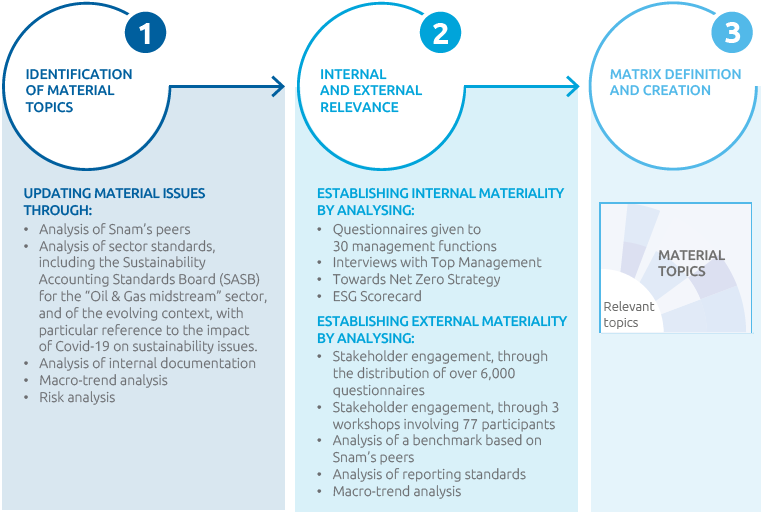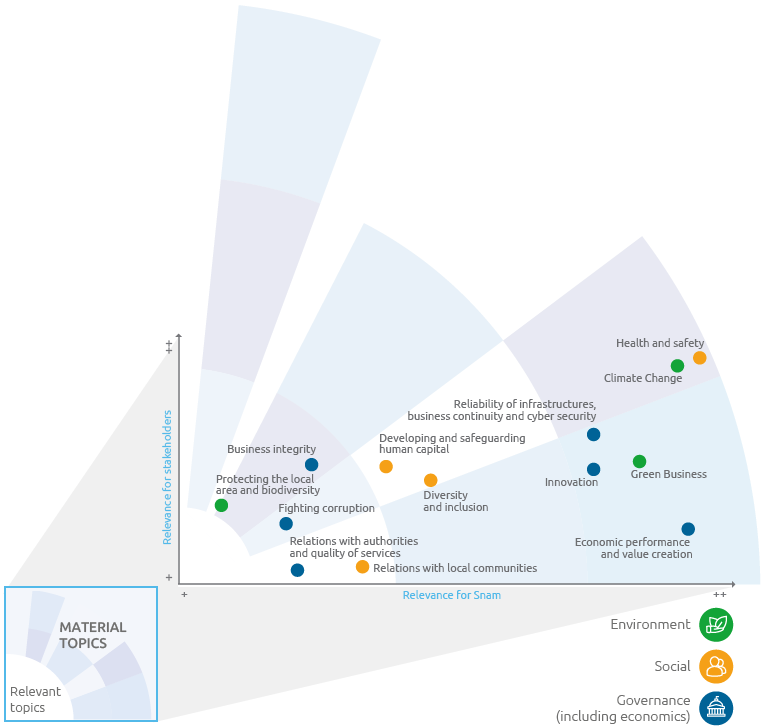Material topics in relation to the activities carried out
Through stakeholder engagement activities carried out through the year, the Group updated its materiality analysis to identify relevant sustainability issues that offer a significant indication of the organisation’s economic, environmental and social impacts, or which influence stakeholder decisions.
This analysis, which is done annually, included consideration of the areas established under Italian Legislative Decree 254/2016 and the main aspects which characterise the sector in which Snam works, to the extent needed to ensure a full understanding of the Company’s activities, its performance, results and the impacts generated.
The process to update material topics included the following activities:

To assess the external relevance of issues, over 6,000 stakeholders were reached through specific questionnaires (including employees), with an overall response rate of around 32%. Additionally, three insight workshops were carried out with the involvement of 77 people, including suppliers, clients, and employees. The 2020-2024 Strategic Plan was presented during these meetings, with special attention paid to sustainability issues, introduced together with all the issues to be evaluated with regards to the materiality analysis. Participants were then able to evaluate these issues in real time through the use of an interactive tools to analyse and discuss the results directly during the meeting.
To assess internal materiality, Snam managers were involved so as to obtain a holistic and shared view of the Company’s priorities.
The result of this process led to the identification of material sustainability issues and definition of the materiality matrix. This materiality matrix was then validated by management and the Company’s Chief Executive Officer, and then presented to the Environmental, Social and Governance (ESG) Committee and the Board of Directors.

ISSUES |
DEFINITION |
SDGs |
|---|---|---|
Health and safety |
Adopting practices and systems to safeguard the health and safety of employees and third parties involved in company activities (e.g. suppliers), including in relation to the pandemic. |
3,8 |
Climate Change |
Promoting strategies for the control of climate change, in order to reduce greenhouse gases and environmental impact. Developing initiatives to improve energy efficiency in the Group’s plants and sites, promoting a more sustainable way of doing business by using and producing energy from renewable sources. |
7,13 |
Reliability of infrastructures, business continuity and cyber security |
Ensuring the reliability of infrastructures and services in order to prevent and/or mitigate potential situations that could compromise the business continuity (e.g. emergencies, pandemic-related issues). Managing computer security, particularly in relation to potential cyber attacks, and in the light of the ever-increasing use of IT tools (which has further accelerated in the wake of the Covid-19 pandemic). |
9 |
Green business |
Promoting a low-carbon, circular economy by integrating operations with new businesses that support the decarbonisation processes, such as biomethane, hydrogen, the use of gas for sustainable mobility (CNG, LNG), and new technologies capable of incorporating renewable energy from the environment. |
11,13 |
Business Integrity |
Conducting activities with integrity and fairness, in accordance with legal standards, regulations, prescriptions and company policies which add to and improve on the former. Ensuring a responsible approach to fiscal strategy and guaranteeing the efficiency of corporate governance, with a particular focus on the issues of remuneration and balanced participation in the main corporate governance bodies. |
16 |
Developing and safeguarding human capital |
Encouraging professional development and policies for attracting and retaining talent, strengthening the technical, managerial and organisational skills of employees. |
8 |
Economic performance and value creation |
Promoting the creation of shared value in the medium-/long-term for all categories of stakeholders, through operational and financial efficiency and committing to the development of business activities capable of generating value for all stakeholders. |
8 |
Innovation |
Searching for new technologies with the aim of increasing efficiency in conducting business and reducing environmental impact, including from a circular economy perspective. Making the most of technological innovation (e.g. the cloud, AI, etc.) to increase efficiency in operations and in the services offered, to digitalise and optimise the monitoring and management of infrastructures, and to easily integrate new Green business opportunities. |
9 |
Relations with authorities and quality of services |
Guaranteeing customers a safe and reliable service over time, in accordance with the principles of competition, equal treatment and access to infrastructures, and promoting constructive, transparent relations with the regulatory authorities and with institutions in order to develop services which satisfy customers while at the same time considering the needs and demands of the market. |
16 |
Diversity and inclusion |
Promoting and guaranteeing equal opportunities for all employees, valuing and protecting diversity (in terms of race, religion, culture, gender, sexual orientation and age), and promoting initiatives for dialogue and collaboration in order to grasp the opportunities offered by different experiences, expertise, abilities and backgrounds. |
5,10 |
Relations with local communities |
Involving local communities in order to develop projects that can effectively meet the expectations of stakeholders, and supporting local communities during times of crisis and economic/health-related uncertainty, also in order to strengthen the licence to operate. |
8,11 |
Fighting corruption |
Adopting preventive arrangements and targeted policies, in addition to promoting partnerships dedicated to fighting corruption and crime in general, and fostering a culture of legality. |
16 |
Protecting local areas and biodiversity |
Safeguarding the landscapes of the territories where Group plants or facilities are located and safeguarding the environment both during commissioning and ordinary management, including policies to protect the soil, subsoil and water table during operations. |
14,15 |
Because of the pandemic, the issue of health and safety was again confirmed as a priority for the Group, as was climate change, which saw an increase with respect to 2019, confirming its commitment to decarbonisation. Additionally, relations with authorities and quality of services saw its position rise higher, becoming one of the material topics.
On the other hand, in contrast to 2019, the issue of brand reputation was not included among material topics, despite its continuing relevance, thanks to the significant brand building work done in past years that clearly strengthened the Group’s approach to this issue.
The analyses described above also made it possible to identify further issues which, although not material, are, however, relevant for Snam or its stakeholders and are carefully supervised and monitored:
- Supply chain: the use of selection policies for suppliers, collaborators and commercial partners based on equitable and transparent processes that integrated sustainability criteria intended to promote socially responsible practices among suppliers, with the aim of establishing long-term cooperative relationships and developing innovative approaches in the context of the circular economy.
- Waste management: efficient management of the disposal of materials used during productive activities and when constructing Group infrastructure. The waste produced by Snam mainly derives from the maintenance and management of plants but has always been an environmental aspect of limited relevance, both in terms of the quantity and type of waste. Other waste derives from sludge, typically generated through well drilling activity.
- Water resource management: optimisation of the consumption and management of water resources involved in Snam activities and the adoption of policies and practices which support responsible water use. Snam uses seawater to cool the auxiliary equipment at the liquefied natural gas regasification plant, which is fully returned to the sea in the same amount but at a higher temperature (in accordance with the law). Fresh water is used for irrigation, when taken from wells, and for office and the fire extinguishing system, when taken from the aqueduct.
- Employment: the promotion of stable and continuous employment, guaranteeing a healthy workplace and generational turnover in line with business development, as well as a welfare system and effective work/life balance.
- Brand reputation: taking advantage of and protecting the brand through constant relations with all relevant Group stakeholders, in particular the financial community and investors.
- Respect for human rights: promoting respect for human rights throughout the value chain (suppliers, employees, clients). Given the type and geographical placement of its business, Snam considers protection of human rights to be linked in particular to aspects of diversity and equal opportunity, in this context in particular relative to non-discrimination. Further issues may potentially arise along the supply chain, for which specific initiatives have been implemented to ensure the upholding of human rights in business relations.
- Air quality protection: promotion of initiatives to reduce and limit the emission of air pollutants. The only significant pollutant emissions produced by Snam are emissions of nitrogen oxide (NOx), which mainly derive from the burning of natural gas in turbines installed in the compression plants (thrust and storage).